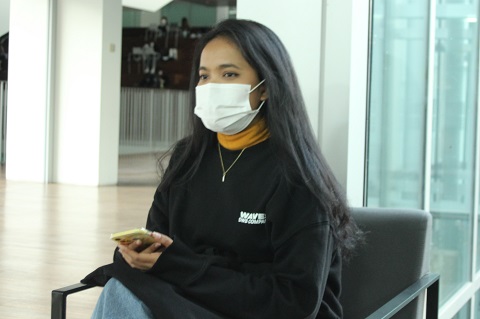
The continued effects of COVID-19 have lengthened the duration of remote classes. Consequently, characteristics of online classes have made it challenging for international students to cope. Based on 2019 statistics, Ewha’s international students make up about 10 percent of the entire student population. Although the school has enacted measures to alleviate student concerns, many students hope further action is taken to overcome this problem.
Annelise Dussud, a freshman in Division of International Studies, explained the problems of being restricted to online courses. She mentioned that taking remote classes can make communication difficult, as opportunities to ask classmates or professors questions are rare. Furthermore, it is harder for students to actively participate in online class discussions due to technical restrictions.
“As an international student in Korea, it is very frustrating to take everything online and not being able to meet classmates or use school facilities,” Dussud said. “Also, it’s very hard to focus when you are studying either in your room or in a cafe.”
The Office of International Affairs (OIA) stated that programs such as Ewha Mate, and Ewha Academic Assistance System for International Students (EAASIS) Mentoring are being offered to alleviate students’ difficulties regarding this matter. They also mentioned they offer assistance to students who wish to further enhance their Korean by taking the Test of Proficiency in Korean (TOPIK).
Ma Wenwen, a student participating in the EAASIS Mentoring program was extremely satisfied with the program, as it allowed her to make a Korean friend and ask her any questions she had with her school life.
As online classes have become the norm, CyberCampus now plays several roles beyond simply providing class materials, creating new problems.
One such problem occurs when checking attendance. Methods for attendance verification vary from class to class. For example, in live online classes, students’ names are called and the attendance is determined based on their response. In other cases, students are asked to use the automatic attendance system in CyberCampus to enter the designated number.
Meiying Su, an exchange student at Ewha, expressed difficulty confirming attendance online.
“For one of my classes, we have to use the automatic attendance system within a limited time before class starts. However, since I am not fluent in Korean yet, I could not fully understand the instructions and was once marked absent.”
Like Su, Department of Korean Language & Literature senior Tiara Maya Azizah stated that the notification alarm of CyberCampus is not punctual, resulting in an inability to check attendance on time.
Azizah also finds it difficult to watch recorded lectures on CyberCampus. Although she has downloaded the CyberCampus App on her iPad to watch recorded lectures, there have been cases where the progress status is not marked complete.
“Although this semester offers hybrid classes, students who take online classes outnumber those who do not,” Azizah said. “I wish the CyberCampus server would work more smoothly, considering our situation.”
The school’s CyberCampus manager stated that the system updates itself every 15 minutes to complete processes, post notifications, and more. Due to technical reasons, although the 15minute cycle is optimal, staring from next semester CyberCampus will exclude notifications from the cycle and send them more punctually for more flexible operation.

